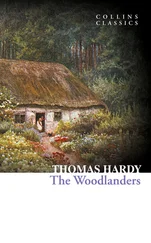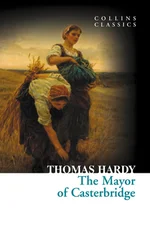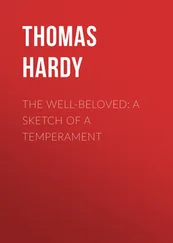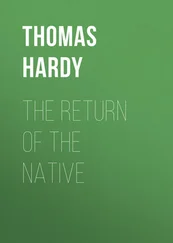"What's the matter?" he asked, speaking for the first time sternly. "You shrink from me again?—just as formerly!"
"No, Richard—I—I—was not thinking—"
"You wish to come in here?"
"Yes."
"You still bear in mind what it means?"
"Yes. It is my duty!"
Placing the candlestick on the chest of drawers he led her through the doorway, and lifting her bodily, kissed her. A quick look of aversion passed over her face, but clenching her teeth she uttered no cry.
Mrs. Edlin had by this time undressed, and was about to get into bed when she said to herself: "Ah—perhaps I'd better go and see if the little thing is all right. How it do blow and rain!"
The widow went out on the landing, and saw that Sue had disappeared. "Ah! Poor soul! Weddings be funerals 'a b'lieve nowadays. Fifty-five years ago, come Fall, since my man and I married! Times have changed since then!"
Despite himself Jude recovered somewhat, and worked at his trade for several weeks. After Christmas, however, he broke down again.
With the money he had earned he shifted his lodgings to a yet more central part of the town. But Arabella saw that he was not likely to do much work for a long while, and was cross enough at the turn affairs had taken since her remarriage to him. "I'm hanged if you haven't been clever in this last stroke!" she would say, "to get a nurse for nothing by marrying me!"
Jude was absolutely indifferent to what she said, and indeed, often regarded her abuse in a humorous light. Sometimes his mood was more earnest, and as he lay he often rambled on upon the defeat of his early aims.
"Every man has some little power in some one direction," he would say. "I was never really stout enough for the stone trade, particularly the fixing. Moving the blocks always used to strain me, and standing the trying draughts in buildings before the windows are in always gave me colds, and I think that began the mischief inside. But I felt I could do one thing if I had the opportunity. I could accumulate ideas, and impart them to others. I wonder if the founders had such as I in their minds—a fellow good for nothing else but that particular thing? … I hear that soon there is going to be a better chance for such helpless students as I was. There are schemes afoot for making the university less exclusive, and extending its influence. I don't know much about it. And it is too late, too late for me! Ah—and for how many worthier ones before me!"
"How you keep a-mumbling!" said Arabella. "I should have thought you'd have got over all that craze about books by this time. And so you would, if you'd had any sense to begin with. You are as bad now as when we were first married."
On one occasion while soliloquizing thus he called her "Sue" unconsciously.
"I wish you'd mind who you are talking to!" said Arabella indignantly. "Calling a respectable married woman by the name of that—" She remembered herself and he did not catch the word.
But in the course of time, when she saw how things were going, and how very little she had to fear from Sue's rivalry, she had a fit of generosity. "I suppose you want to see your—Sue?" she said. "Well, I don't mind her coming. You can have her here if you like."
"I don't wish to see her again."
"Oh—that's a change!"
"And don't tell her anything about me—that I'm ill, or anything. She has chosen her course. Let her go!"
One day he received a surprise. Mrs. Edlin came to see him, quite on her own account. Jude's wife, whose feelings as to where his affections were centred had reached absolute indifference by this time, went out, leaving the old woman alone with Jude. He impulsively asked how Sue was, and then said bluntly, remembering what Sue had told him: "I suppose they are still only husband and wife in name?"
Mrs. Edlin hesitated. "Well, no—it's different now. She's begun it quite lately—all of her own free will."
"When did she begin?" he asked quickly.
"The night after you came. But as a punishment to her poor self. He didn't wish it, but she insisted."
"Sue, my Sue—you darling fool—this is almost more than I can endure! … Mrs. Edlin—don't be frightened at my rambling—I've got to talk to myself lying here so many hours alone—she was once a woman whose intellect was to mine like a star to a benzoline lamp: who saw all my superstitions as cobwebs that she could brush away with a word. Then bitter affliction came to us, and her intellect broke, and she veered round to darkness. Strange difference of sex, that time and circumstance, which enlarge the views of most men, narrow the views of women almost invariably. And now the ultimate horror has come—her giving herself like this to what she loathes, in her enslavement to forms! She, so sensitive, so shrinking, that the very wind seemed to blow on her with a touch of deference… As for Sue and me when we were at our own best, long ago—when our minds were clear, and our love of truth fearless—the time was not ripe for us! Our ideas were fifty years too soon to be any good to us. And so the resistance they met with brought reaction in her, and recklessness and ruin on me! … There—this, Mrs. Edlin, is how I go on to myself continually, as I lie here. I must be boring you awfully."
"Not at all, my dear boy. I could hearken to 'ee all day."
As Jude reflected more and more on her news, and grew more restless, he began in his mental agony to use terribly profane language about social conventions, which started a fit of coughing. Presently there came a knock at the door downstairs. As nobody answered it Mrs. Edlin herself went down.
The visitor said blandly: "The doctor." The lanky form was that of Physician Vilbert, who had been called in by Arabella.
"How is my patient at present?" asked the physician.
"Oh bad—very bad! Poor chap, he got excited, and do blaspeam terribly, since I let out some gossip by accident—the more to my blame. But there—you must excuse a man in suffering for what he says, and I hope God will forgive him."
"Ah. I'll go up and see him. Mrs. Fawley at home?"
"She's not in at present, but she'll be here soon."
Vilbert went; but though Jude had hitherto taken the medicines of that skilful practitioner with the greatest indifference whenever poured down his throat by Arabella, he was now so brought to bay by events that he vented his opinion of Vilbert in the physician's face, and so forcibly, and with such striking epithets, that Vilbert soon scurried downstairs again. At the door he met Arabella, Mrs. Edlin having left. Arabella inquired how he thought her husband was now, and seeing that the doctor looked ruffled, asked him to take something. He assented.
"I'll bring it to you here in the passage," she said. "There's nobody but me about the house to-day."
She brought him a bottle and a glass, and he drank.
Arabella began shaking with suppressed laughter. "What is this, my dear?" he asked, smacking his lips.
"Oh—a drop of wine—and something in it." Laughing again she said: "I poured your own love-philtre into it, that you sold me at the agricultural show, don't you re-member?"
"I do, I do! Clever woman! But you must be prepared for the consequences." Putting his arm round her shoulders he kissed her there and then.
"Don't don't," she whispered, laughing good-humouredly. "My man will hear."
She let him out of the house, and as she went back she said to herself: "Well! Weak women must provide for a rainy day. And if my poor fellow upstairs do go off—as I suppose he will soon—it's well to keep chances open. And I can't pick and choose now as I could when I was younger. And one must take the old if one can't get the young."
Читать дальше












